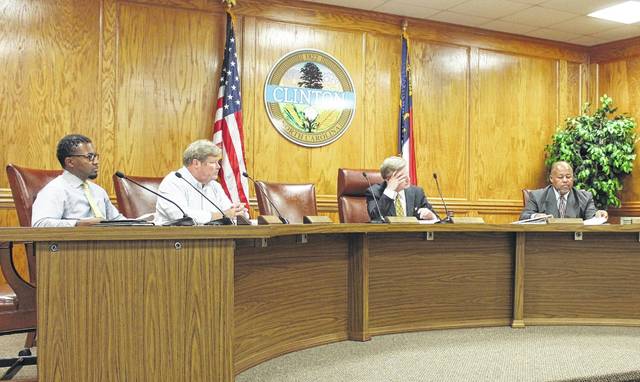In a matter of minutes Thursday night, the City Council unanimously approved the 2017-18 budget, which calls for slight utility rate increases while implementing significant raises for the city’s police officers and firefighters.
The 2017-18 budget totals $14,355,300 for all city operations, capital improvements and debt service requirements. That is in line with the 2016-17 amended budget. The property tax rate will remain at 40 cents per $100 valuation and 18 cents in the Downtown Special District.
“It is a responsible budget with no tax increases,” said Mayor Lew Starling.
Of the roughly $14.36 million, the 2017-18 General Fund totals roughly $9.32 million, the Water and Sewer Fund totals $4.91 million. There are also non-major fund expenditures of $119,200.
Water and sewer rates will rise by 2 percent in 2017-18 to adjust for inflation and ensure adequate funding for future capital projects. Water base rates increase from $12.62 to $12.87 and sewer base rates from $13.15 to $13.41. The water consumption rate will go up from $1.89 to $1.93 per 100 cubic feet, and the sewer consumption rate from $1.84 to $1.88 per 100 cubic feet for 2017-18. Water and sewer rates are double for customers outside the city limits.
Garbage collection rates will remain $15.50 per month for residential customers, $4.75 per cubic yard for commercial customers.
“We have had hearings on the budget and it is a very positive budget,” Starling remarked during the brief meeting Thursday. “We put a substantial pay increase for our public safety and other groups. We hope to expand that next year for all employees. Everybody got a raise, but with a particular focus on public safety based on our study. We will continue that next year.”
All police officers and firefighters in the City of Clinton are poised to receive raises as part of the 2017-18 budget, a proposal that city officials are touting as a way to make annual wages for public safety positions more competitive and aid recruitment and retention of valued employees.
That bump would be in the form of a budgeted $253,600, which includes salaries and benefits. On average, that would translate into an increase of 12 percent for police officers ($170,000 total) and 8 percent for firefighters (roughly $70,000). The balance will be used for two reclassified Public Works positions.
For the 2017-18 budget year, the recommended annual adjustment for all employees would be a 1.5 percent for cost of living adjustment and an additional half percent for merit up to another 1.5 percent for all employees.
Sales tax revenues, which rose in the current year, are anticipated to grow further in 2017-18 to the tune of an additional 3.6 percent, according to projections. Additionally, the ad valorem tax base is an estimated $771 million, a 5 percent increase over last year. That base will generate more than $3 million.
Since the early 1980s, the city has also levied a municipal vehicle tax of $5 as authorized by N.C. General Statute. For 2016-17, the City Council increased the vehicle tax from $5 to $10. The initial $5 is for general purpose, but the law allows for towns without public transit to increase the tax up to $25 for street resurfacing, repairs and maintenance.
While originally proposed to stay at $10, that tax will rise again to $15 in 2017-18. It is expected to generate roughly $90,000, compared to $62,000 with a $10 tax.
Public safety raises
The proposal to give across-the-board raises to firefighters and police officers followed a Classification and Compensation Study recently conducted by the MAPS Group. The purpose of the study was to ensure the city is able to recruit and retain employees by evaluating market competitiveness and internal equity concerns such as compression, which occurs when newly hired employees receive the same or similar compensation as more tenured employees.
Former Police Chief Jay Tilley said during budget deliberations that it has been increasingly difficult to compete not just with other police departments in the region regarding compensation, but with state agencies, such as community colleges and others.
Currently, Clinton police officers who have graduated BLET (Basic Law Enforcement Training) start at around $30,000 a year. After a probationary period, that goes up to between $31,500 and $32,000. With the proposed increase, that starting salary will be in the range of $35,000 to $36,000. Raleigh officers start at approximately $40,000.
Fire Chief Scott Phillips concurred during budget talks, echoing Tilley’s optimism on the prospect of retaining current employees.
“It’s going to make it hard for my guys to leave,” said Phillips. “My primary firefighter coming in is $29,000 to $30,000 and now it will be $34,000 to $35,000. We’re very competitive now.”
Of the $253,600 budgeted, $235,000 would go to the personnel with the fire and police departments.
Additionally, the two Public Works positions would make up about $5,000 to $6,000 apiece with benefits, as they would be promotions for current employees to two new positions — streets supervisor and sanitation supervisor. The Council is expected to implement the study’s structure and salary recommendations over a two-year period, including other employees in year two.
The original proposed budget included a 5 percent increase in the medical insurance benefit. The increase included in the final 2017-18 proposal totaled 15 percent, representing a total cost of $929,800, or $702,100 in the General Fund and $227,700 in the Water and Sewer Fund.
The recommended budget does not include use of fund balance or retained earnings for 2017-18.

